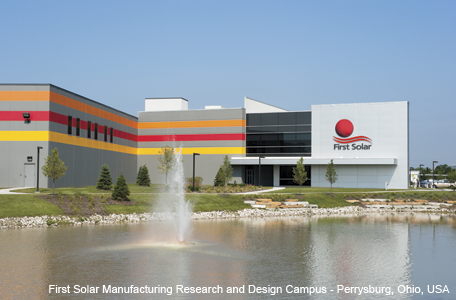First Solar Takes Hit On Reliability Issues

First Solar's factory in Ohio | Photo: First Solar
Thin-film photovoltaic panel manufacturer First Solar is having a bad week. On Friday, analyst Mark Bachman of Avian Securities changed his rating of the solar firm's shares to negative based on reports of flaws in First Solar photovoltaic modules. First Solar's stock fell by 11% that day, recovering only slightly in the few trading days since.
The culprit is a flawed attachment in 232,000 modules built in 2008 and 2009, which have been coming loose from junction boxes. The company will be repairing or replacing the modules under the terms of their warranty.
"One of the greatest risks to investing in shares of First Solar is the real (or perceived) durability and reliability of its product," said Bachman.
First Solar issued a statement to the press soon after the Avian downgrade:
First Solar has determined there are approximately 232,000 modules in the field, manufactured between October 2008 and June 2009, which may over time develop a loose cord plate attachment. We know the serial numbers of the affected modules and are working proactively with the system owners to repair or replace the affected modules consistent with our workmanship warranty. For roof-mounted systems we also will remove and replace the affected modules at no cost to the system owner, which is above and beyond our standard workmanship warranty. The issue is not expected to have a significant impact on earnings and was considered in the updated financial guidance for 2012 that we announced on August 1st.
If uncorrected, the loose junction box connection could pose a safety issue to workers and others who handle the modules. Avian also suggested the loose connections may pose a risk of fire. Replacement is likely to be fairly straightforward in utility-scale ground-mounted arrays, but significantly less so for rooftop installations.
This isn't the first problem First Solar has had with its products. Another batch of modules made in 2008 and 2009 suffered equipment failures that caused them to stop working, costing First Solar some cash earlier this year to replace them -- and also costing the company in lost revenue from power production. And this year also brought news that the firm's cadmium telluride panels suffered degradation in hot climates, with some evidence that panels' useful life in hot climates may be half what the company expected. For its part, First Solar says that the accelerated degradation of their modules isn't all that significant.
But cadmium telluride PV is a new technology, and First Solar's business success rides on how well its products fare in the real world. Silicon PV is a proven technology with decades of data on durability in real-world applications. First Solar's job is to persuade the industry that its thin film is as reliable as silicon and cheaper to boot. This week, it looks as though investors aren't quite convinced.
ReWire is dedicated to covering renewable energy in California. Keep in touch by liking us on Facebook, and help shape our editorial direction by taking this quick survey here.